江苏如东县2013-2014学年高一下学期开学初测试英语试题
- 格式:doc
- 大小:139.50 KB
- 文档页数:10
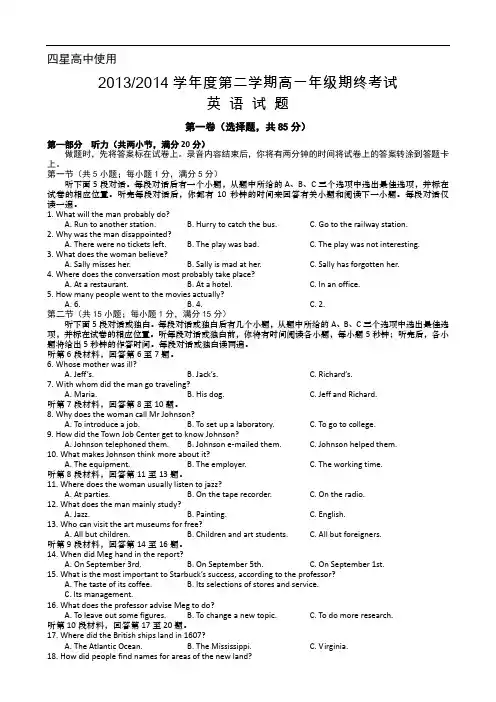
四星高中使用2013/2014学年度第二学期高一年级期终考试英语试题第一卷(选择题,共85分)第一部分听力(共两小节,满分20分)做题时,先将答案标在试卷上。
录音内容结束后,你将有两分钟的时间将试卷上的答案转涂到答题卡上。
第一节(共5小题;每小题1分,满分5分)听下面5段对话。
每段对话后有一个小题,从题中所给的A、B、C三个选项中选出最佳选项,并标在试卷的相应位置。
听完每段对话后,你都有10秒钟的时间来回答有关小题和阅读下一小题。
每段对话仅读一遍。
1. What will the man probably do?A. Run to another station.B. Hurry to catch the bus.C. Go to the railway station.2. Why was the man disappointed?A. There were no tickets left.B. The play was bad.C. The play was not interesting.3. What does the woman believe?A. Sally misses her.B. Sally is mad at her.C. Sally has forgotten her.4. Where does the conversation most probably take place?A. At a restaurant.B. At a hotel.C. In an office.5. How many people went to the movies actually?A. 6.B. 4.C. 2.第二节(共15小题;每小题1分,满分15分)听下面5段对话或独白。
每段对话或独白后有几个小题,从题中所给的A、B、C三个选项中选出最佳选项,并标在试卷的相应位置。
听每段对话或独白前,你将有时间阅读各小题,每小题5秒钟;听完后,各小题将给出5秒钟的作答时间。
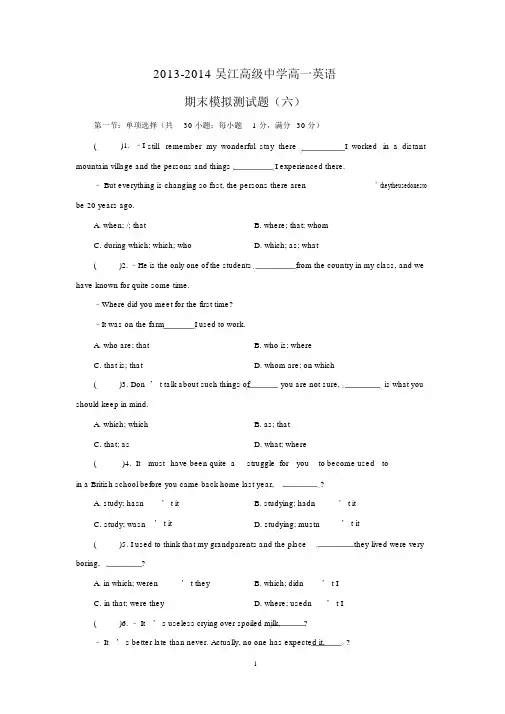
2013-2014 吴江高级中学高一英语期末模拟测试题(六)第一节:单项选择(共30 小题;每小题 1 分,满分30 分)()1. –I still remember my wonderful stay there I worked in a distant mountain village and the persons and things I experienced there.– But everything is changing so fast, the persons there aren_____’theytheusedonesto be 20 years ago.A. when; /; thatB. where; that; whomC. during which; which; whoD. which; as; what()2. –He is the only one of the students from the country in my class, and we have known for quite some time.–Where did you meet for the first time?–It was on the farm I used to work.A. who are; thatB. who is; whereC. that is; thatD. whom are; on which()3. Don ’ t talk about such things of you are not sure,is what you should keep in mind.A. which; whichB. as; thatC. that; asD. what; where()4. It must have been quite a struggle for you to become used to_________ in a British school before you came back home last year,?A. study; hasn’ t itB. studying; hadn’ t itC. study; wasn’ t itD. studying; mustn’ t it()5. I used to think that my grandparents and the place they lived were very boring,?A. in which; weren’ t theyB. which; didn’ t IC. in that; were theyD. where; usedn’ t I()6. – It’ s useless crying over spoiled milk,?– It’ s better late than never. Actually, no one has expected it,?A. is it; have weB. isn ’ t it; have youC. isn ’ t it; have theyD. is it; hasn’ t he()7. Some amazing people have changed our world for ________ through their thoughts and actions.A. a betterB. the betterC. betterD. best()8. –Your uncle seldom smokes heavily nowadays,?–, it’ s two years since he smoked.A. doesn ’ t he; NoB. dose he; NoC. doesn ’ t he; YesD. does he; Yes()9.alone in the dark room, the little boy was so frightened as to cry.A. LeavingB. Having leftC. To be leftD. Left()10. The parcel lot of things, a second-handed dictionary.A. contained; includedB. contained; includingC. included; containedD. included; containing()11. We were really anxious about you. We you back t he whole night, you____home without a word.A. have been expecting; mustn’ t leaveB. had been expecting; mustn’ t have leftC. were expecting; shouldn't have leftD. expected; weren’ t supposed to leave()12. Great determination s a kind of quality–and that’ s it takes to do anything well.A. thatB. whichC. whatD. how()13. –What’ s that building?–the medical equipment is stored.A. That ’ s whereB. That ’ s the building whichC. The building thatD. There’ s in which()14. This kind of computers made by our company best, but several years ago no one could have imagined the role in the markets that they.A. are sold; were playingB. sells; were to playC. is sold; was going to playD. sell; had played()15. At first Mr. Sally was of planes, but two years later,to other countries on business is his main business.A. scared; flyingB. frightening; flightC. frightened; flightD. scaring; flying第三部分:完形填空(共20 小题;每小题 1 分,满分20 分)Show yourselfOn the course of life, the first step of the lead is likely to mean the final victory, so the success and failure, or36and loss of your life may lie in37you dare to show yourselfor not.As a student, I was most38to answer questions in class, and I found that the students around were just like me. At the beginning of each class, when the professor asked a question, Ialways39my head, for fear that the professor saw me.In a foreign language class, an expert from the Commercial Bank delivered a lecture. The speaker always wanted40to be in communication with him, so he asked how many students in the classroom learned Economics, but no one41. The expert said with a smile,“Let me tell you a(n)42first. ”“When I came to the United States to study, there are often lectures delivered in the43.Each time, they invite an expert from Wall Street or a transnational company to make a speech. ”“Before the beginning of every lecture, I found a(n)44phenomenon. The students around me always took a cardboard folded in half, wrote their45with the most eye-catching color, and then placed it on the seat.46, when the speaker needed the response,he could see and call a listener’s name47.”“I couldn ’t 48why they did that, so I asked the student in front of me. He told me witha smile, ‘the speakers are all top-ranking people, who his50or surprise, it is very possible that he will 49chances. When your answer is to give you more51 . This is a verysimple reason.’“The fact was also like that. I really saw a few students around me went to52in the first class company53their excellent insights ( 洞察力 ). This had a great influence on me. The chance will not find you54 . Y ou must show yourself constantly to 55others’attention for you to find a chance on the cards. ”36.A. win B. beat C. gain D. defeat37.A. how B. what C. that D. whether38.A. proud B. ready C. excited D. afraid39.A. raised B. shook C. lowered D. nodded40.A. anyone B. someone C. everyone D. no one41.A. replied B. agreed C. reported D. admitted42.A. idea B. fact C. truth D. story43.A. company B. hospital C. university D. business44.A. tense B. interesting C. attractive D. dull45.A. addresses B. numbers C. names D. cards46.A. Besides B. However C. Otherwise D. Thus47.A. directly B. loudly C. firstly D. rapidly48.A. make for B. make up C. make out D. make sense49.A. present B. mean C. multiply D. add50.A. disappointment B. amusement C. satisfaction D. astonishment51.A. chances B. questions C. responses D. jobs52.A. approve B. employ C. manage D. work53.A. in spite of B. due to C. aside from D. as to54.A. themselves B. himself C. yourself D. itself55.A. pay B. draw C. focus D. fix第四部分:阅读理解(每小题 2 分,共 15 小题,满分30 分)请认真阅读下列短文, 从短文后各题所给的 A 、B、C、D 四个选项中 , 选出最佳选项 , 并在答题纸上将该项涂黑。
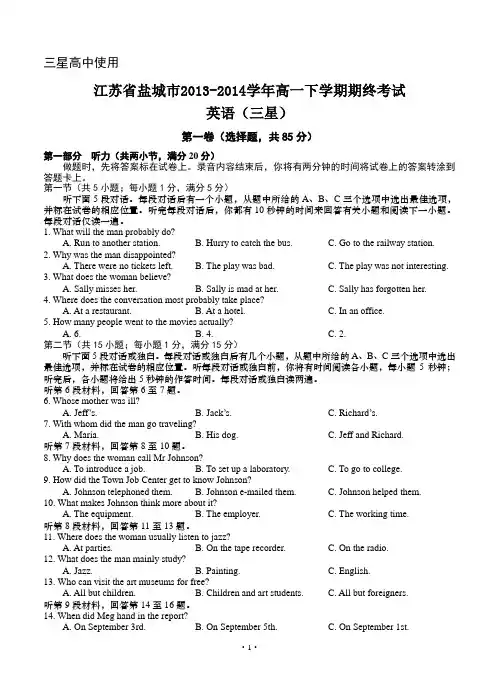
三星高中使用江苏省盐城市2013-2014学年高一下学期期终考试英语(三星)第一卷(选择题,共85分)第一部分听力(共两小节,满分20分)做题时,先将答案标在试卷上。
录音内容结束后,你将有两分钟的时间将试卷上的答案转涂到答题卡上。
第一节(共5小题;每小题1分,满分5分)听下面5段对话。
每段对话后有一个小题,从题中所给的A、B、C三个选项中选出最佳选项,并标在试卷的相应位置。
听完每段对话后,你都有10秒钟的时间来回答有关小题和阅读下一小题。
每段对话仅读一遍。
1. What will the man probably do?A. Run to another station.B. Hurry to catch the bus.C. Go to the railway station.2. Why was the man disappointed?A. There were no tickets left.B. The play was bad.C. The play was not interesting.3. What does the woman believe?A. Sally misses her.B. Sally is mad at her.C. Sally has forgotten her.4. Where does the conversation most probably take place?A. At a restaurant.B. At a hotel.C. In an office.5. How many people went to the movies actually?A. 6.B. 4.C. 2.第二节(共15小题;每小题1分,满分15分)听下面5段对话或独白。
每段对话或独白后有几个小题,从题中所给的A、B、C三个选项中选出最佳选项,并标在试卷的相应位置。
听每段对话或独白前,你将有时间阅读各小题,每小题5秒钟;听完后,各小题将给出5秒钟的作答时间。
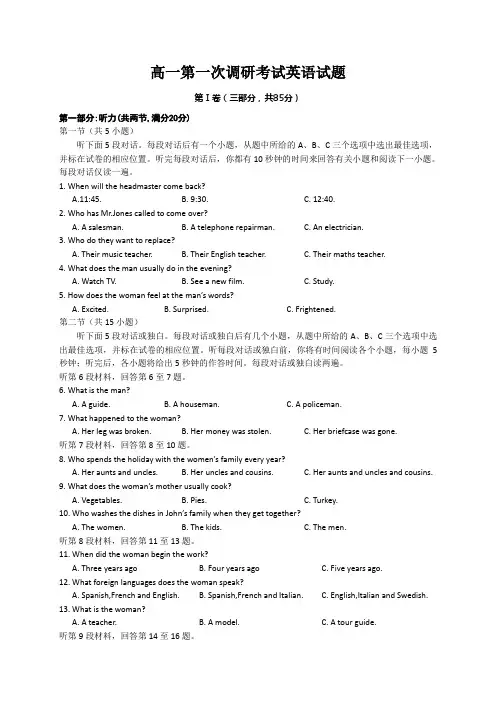
高一第一次调研考试英语试题第Ⅰ卷(三部分,共85分)第一部分:听力(共两节,满分20分)第一节(共5小题)听下面5段对话。
每段对话后有一个小题,从题中所给的A、B、C三个选项中选出最佳选项,并标在试卷的相应位置。
听完每段对话后,你都有10秒钟的时间来回答有关小题和阅读下一小题。
每段对话仅读一遍。
1. When will the headmaster come back?A.11:45.B. 9:30.C. 12:40.2. Who has Mr.Jones called to come over?A. A salesman.B. A telephone repairman.C. An electrician.3. Who do they want to replace?A. Their music teacher.B. Their English teacher.C. Their maths teacher.4. What does the man usually do in the evening?A. Watch TV.B. See a new film.C. Study.5. How does the woman feel at the man’s words?A. Excited.B. Surprised.C. Frightened.第二节(共15小题)听下面5段对话或独白。
每段对话或独白后有几个小题,从题中所给的A、B、C三个选项中选出最佳选项,并标在试卷的相应位置。
听每段对话或独白前,你将有时间阅读各个小题,每小题5秒钟;听完后,各小题将给出5秒钟的作答时间。
每段对话或独白读两遍。
听第6段材料,回答第6至7题。
6. What is the man?A. A guide.B. A houseman.C. A policeman.7. What happened to the woman?A. Her leg was broken.B. Her money was stolen.C. Her briefcase was gone.听第7段材料,回答第8至10题。
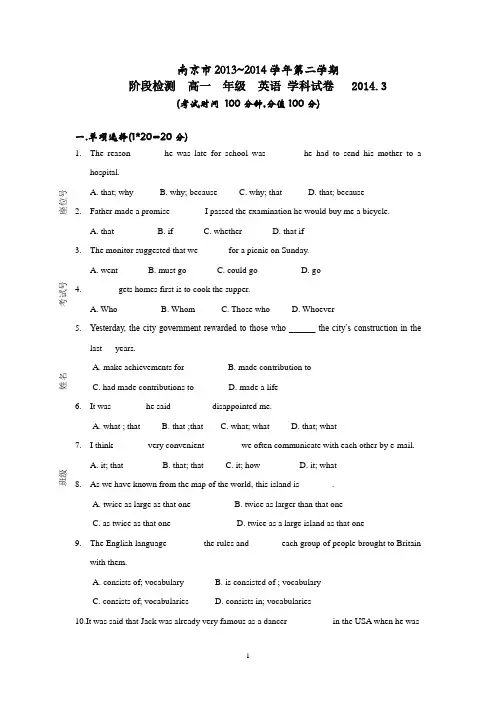
南京市2013~2014学年第二学期阶段检测 高一 年级 英语 学科试卷 2014.3(考试时间 100分钟,分值100分)一.单项选择(1*20=20分)1. The reason ______ he was late for school was _______ he had to send his mother to ahospital.A. that; whyB. why; becauseC. why; thatD. that; because 2. Father made a promise _______ I passed the examination he would buy me a bicycle.A. thatB. ifC. whetherD. that if 3. The monitor suggested that we ______ for a picnic on Sunday.A. wentB. must goC. could goD. go 4. ______ gets homes first is to cook the supper.A. WhoB. WhomC. Those whoD. Whoever5. Yesterday, the city government rewarded to those who ______ the city’s construction in thelast years.A. make achievements forB. made contribution toC. had made contributions toD. made a life 6. It was _______ he said _________disappointed me.A. what ; thatB. that ;thatC. what; whatD. that; what7. I think _______ very convenient ________we often communicate with each other by e-mail.A. it; thatB. that; thatC. it; howD. it; what 8. As we have known from the map of the world, this island is _______.A. twice as large as that oneB. twice as larger than that oneC. as twice as that oneD. twice as a large island as that one9. The English language________ the rules and_______ each group of people brought to Britainwith them.A. consists of; vocabularyB. is consisted of ; vocabularyC. consists of; vocabulariesD. consists in; vocabularies10.It was said that Jack was already very famous as a dancer __________in the USA when he was班级 _______________ 姓名 ______________考试号 ______________座位号______________only twelve.A. in his twentiesB. on the twentiesC. of twentyD. in the twenties11. ________ we were worried about was ________ they could manage to control the pollution.A. That; howB. That; whetherC. What; thatD. What; whether12. She said that it ___________ the second time she _______________ the film.A. was ; had seenB. is; has seenC. would be; had seenD. was; saw13. Mr. Wang came home so thin and weak that his own children hardly______ him.A. knewB. realizedC. recognizedD. noticed14. It is said _______ _______ was all _______ he said.A. that; that; thatB. what; what; whatC. that; which; whatD. that; that; which15. Our hometown is quite different from ______before.A. that it wasB. what it wasC. which it wasD. when it was16. Our plan certainly _________; it was a great idea.A. paid offB. paid backC. carried outD. paid for17. His ideas are very interesting, but we need _______ suggestions to get us out of the mess.A. pureB. similarC. practicalD. traditional18. ----Haven’t you graduated from your university?----Yes, I _______ in the English Department of Shandong University for four years.A. studiedB. studyC. had studiedD. was studying19. ----Tell me where you live, please.---- I live _______.A. in 123, King StreetB. at 123, King StreetC. in King Street, 123D. at King Street, 12320.----The housework is too much for me, Jack.----Sorry, but I can‘t help_______. Joan, I‘ve got something important to do, you know.A. doB. doingC. to be doingD. having done二.完型填空(20分)Body language is very important in communication. Studies __21__ that only 7%of the communication in daily 22 is in words. Westerners 23 people to look at each other in the eyes when they 24 . If you don’t do that while you are talking, it may show that you do notlike the person, 25 that you are not interested in 26 the person says. When 27 hands westerners will shake two or three times. Do not shake a 28 hand for a long time. When a man shakes hands with a 29 , it is 30 for the woman to hold out 31 hand first in the west. Pointing with one finger at a person 32 talking usually means that the person who is 33 is criticizing the person 34 is pointed at. 35 , men in English-speaking countries touch men much 36 than men touch men in China. But men and women touch each other 37 more often than men and women touch each other publicly in China.Boyfriends and girlfriends often 38 hands, embrace(拥抱)or kiss in public. Good friends often 39 one another with a kiss on the cheek, if they are women or of 40 sexes.21. A. show B. say C. prove D. report22. A. lives B. life C. live D. living23. A. hope B. prefer C. expect D. ask24. A. speak B. tell C. say D. talk25. A. and B. but C. except D. or26. A. what B. that C. which D. where27. A. shaking B. shake C. shaken D. being shaken28. A. person’s B. Englishman’s C. Chinese’s D. westerner’s29. A. man B. girl C. woman D. who30. A. worse B. better C. right D. impolite31. A. her B. she C. his D. him32. A. while B. as C. after D. before33. A. speaking B. hearing C. listening D. smiling34. A. whom B. who C. which D. whose35. A. However B. Except C. But D. Besides36. A. more B. less C. longer D. harder37. A. in public B. outside C. secretly D. at home38. A. touch B. hold C. wave D. catch39. A. greet on B. greet C. greet to D. greet with40. A. same B. female C. male D. opposite三.阅读理解(12*2=24分)A.The Americans believe that anybody can become President of the United States. In a recent Hollywood comedy, that is exactly what happens.Dave Kovic, played by Kevin Kline, is a kind-hearted man who runs a business that finds people jobs. He leads a typical American way of life, except for one thing-he looks exactly like the President, Bill Mitchell. In fact, the only thing that makes him different from the nation’s leader is that he is very nice!The president has started using look-alikes during some public appearances. Dave is offered a chance to “serve his country” by becoming one. However, things go wrong. The President becomes very ill and Dave ends up acting as the President forever.Director Ivan Reitman, who made the popular and successful comedies like Twins, Ghostbusters and Legal Eagles, could have gone for easy laughs by making fun of the American government. Instead, Dave is an attractive comedy about an ordinary man in extraordinary situations. Kevin Kline gives a double performance as Dave and the President, and Sigourney Weaver is at her best as his First Lady. The love story that develops between her role and Dave is a real classic.The film is 100% American. However, if you’ve ever felt that anybody could do a bette r job running the country than the people in power, then you’ll enjoy Dave!41.What is the purpose of the text?A.To tell the reader about the American government.B.To discuss the Americans’ ideas about the President.C.To make a comparison between Dave and other films.D.To introduce a new film to the reader.42.Who plays the role of the President in the film?A.Sigourney Weaver. B.Kevin Kline. C.Bill Mitchell D.Ivan Reitman. 43.The underlined word “one” in the 3rd paragraph refers to __________.A.the President B.the director C.an actor D.a look-alike44.Which of the following is best supported by the text?A.The author makes fun of the President. B.The author thinks highly of the film.C.The author is a fan of Hollywood comedies.D.The author wishes to become the American President.B.Your manager comes to you in a panic and asks you to fill in for Sharon, who will be out of town all next week. Your first thought is, “Why me?” Although you are not so happy, you smile and say, “No problem.”Your boss is making the request, after all, so refusal is not an option. Right?Not necessarily. In some cases, “Sorry, I can’t” may be the most appropriate response. Here are two examples of situations in which it might make sense to say no and suggestions for how to turn down the boss.“It seems that Joe can’t make the deadline again. Can you handle it?”The solution(解决方法): If your boss does need your help, taking on the extra work is the right thing to do and can earn you valuable bonus points. However, if these situations arise regularly, to the point where they begin to interfere with(干扰) your regular work, you may need to start pushing back. Next time your boss approaches you seeking emergency assistance, you might say, “Of course I’ll help. But, as you know. I’ve had to cover for others a lot lately, and it’s affecting my own work. Once we get through this project, can we talk about how to better get used to these types of requests in the future?”“Sorry, but you have to work late again tonight. OK? ”The solution:Most employees understand that there are times when they must stay late to finish their work. But when these requests become routine, you should speak up. Putting in extra hours every day can quickly lead to breakdown.Therefore, you might say to your manager, “We’re all working a lot of extra time lately. And these hours are becoming difficult for me to maintain(维持). Will we need to keep this pace much longer? If so, could we talk about ways that might help me achieve a better work/life balance during this period?”It’s never easy to say no to your boss. But in some situations it’s necessary. Even the best managers can fail to recognize when they’re asking too much of their employees. Yes, sometimes you must give in when asked to do something you don’t like. But that doesn’t mean you must agree to unreasonable requests without question.45.Which of the following is the best title?A. How to Say No to Your BossB. How to Deal With the Mean BossC. How to Respond to Unreasonable RequestsD. How to Refuse to Stay late46.The underlined phrase “fill in for ” can be replaced by____________.A. take care ofB. take the place ofC. catch sight ofD. take advantage of47.Which of the following is true of Joe?A. Joe is in hospital.B. Joe is late for work.C. Joe will have a week off next week.D. Joe probably can’t finish work on time.48. What is the writer’s attitude towards working overtime frequently?A. Approval .B. Appreciation.C. Doubt.D. Opposition.49.. According to the passage, turning down your boss is______________.A. difficultB. pleasantC. simpleD. easy.C.Listening, really listening, can improve communication and build respect with others. Communication begins by listening and then suggesting that you hear what the person is saying. This can be recognized by focus or eye contact, body language, and reflective listening.Focus (Eye Contact)—Focus means that you are looking directly at the person speaking and not looking off to one side or continuing to do something else. You are focused on what is being said; the speaker is the center of attention. Listening attentively is necessary for positive communication.Listening Without Interrupting—Does your body acknowledge(承认) that you are listening? Use smiles, nods, and expressions of understanding to communicate with the speaker that you are listening to. It is not necessary that you agree or disagree at this time. It is more important for the person speaking to know that his or her words are respected. This strengthens communication.Reflective Listening—Reflective listening involves hearing the feelings and meanings of the speaker. It is a re-statement (in different words) of what the speaker said. You, in fact, mirror the words of the speaker and rephrase them back to the speaker, checking for accuracy(准确)of understanding. This process affirms(证实) the speaker, indicates a respect of the person, and shows that you understand the speaker’s message. Through careful reflection of th e speaker’s words, you can make clear the message and build mutual(相互的) understanding. Throughreflective listening and the careful exchange of words, we learn that other people have important feelings and opinions which we need to consider. Learning to understand the importance of all ideas, not just our own, can lead to successful resolution of problems and mutual respect.50. The best way to build respect with others is _____.A. to look directly at the person speakingB. to listen to the speaker attentivelyC. to interrupt the speaker when necessaryD. to use expressions of understanding51. What strengthens communication with the person speaking?A. Making him or her know that his or her words are respected.B. Expressing agreement or disagreement in time when listening.C. Repeating his or her words from time to time.D. Listening instead of saying anything.52. Reflective Listening is aimed to _____.A. show you are not absent in mindB. make sure the speaker’s words are correctC. checking for accuracy of understandingD. express your own ideas without delay四.任务型阅读(10*1=l0分)Whenever we meet with difficulty or failure, teachers, parents or others often say to us or per haps we say to ourselves, “Never give up.” These can be encouraging words and words of determi nation. A person who believes in himself will keep trying to reach his goal no matter how many t imes he fails. In my opinion , the quality of determination to succeed is an important one to have. Therefore, I believe that we should never give up.One reason is that if we give up too easily, we will rarely achieve anything. It is not unusual for us to fail in our first attempt at something new, so we should not feel disappointed and should try again. Besides, if we always give up when we fail , we will not be able to develop new skills a nd grow.Another reason we should never give up is that we can learn from our mistakes so that we can not make the same ones. If we do not try again, the lesson we have learned is wasted.Finally, we should never give up because as we work to reach our goals, we develop confiden ce,and this confidence can help us succeed in other areas of our lives. If we never challenge ourselves , we will begin to doubt our abilities.In short, it is important that we do not give up when working for our goals. Whether we succe ed in the end or not , we will learn something , and what we learn will help us to become better an d more confident. Furthermore, if we give up , we have no chance of attaining our goals any more , but if we keep making great efforts, there is always a chance that we will succeed one day.Topic: Never Give Up五.课文填词(10*1=10分)63. According to the o_____________ news, the coal mines have been shut down.64. My mother works on Sundays as a v_______________ at the hospital.65.Do not wear bright clothing or j_____________, because sharks are attracted to the flash ofcolors and bright objects.66. If you think you can carry on driving so fast without being caught by the policemen, thenyou’re m____________.67. His hand faces up and his first finger moves b____________ and forwards.68. At the bus stop, the bus c______________ advised her to take the underground to Green Park.69. The book was written in s________ English so that children can learn by themselves.70. Sometimes to express ideas, some characters were made by c________ two or more characterstogether.71.—They chose me to r___________ them at the meeting.—Good. Then you should be well prepared for the speech.72. —I’m sic k of the dull room. What can I do?—You can change the whole a___________ just by painting it a bright color.六.完成句子(16*1=16)73. 他苏醒过来时,发现自己躺在医院里。
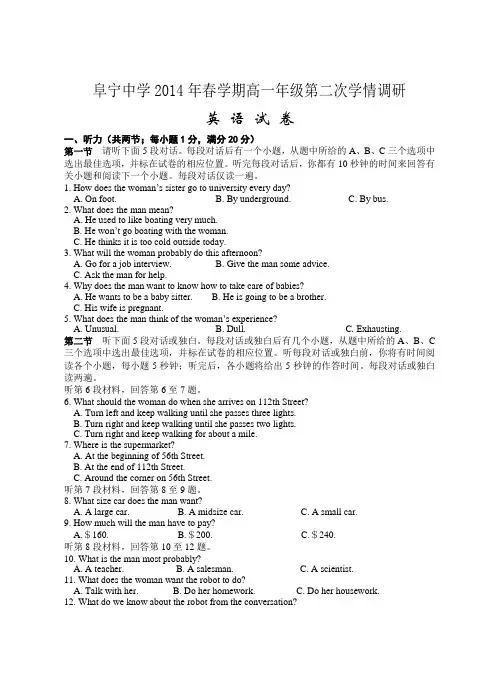
阜宁中学2014年春学期高一年级第二次学情调研英语试卷一、听力(共两节;每小题1分,满分20分)第一节请听下面5段对话。
每段对话后有一个小题,从题中所给的A、B、C三个选项中选出最佳选项,并标在试卷的相应位置。
听完每段对话后,你都有10秒钟的时间来回答有关小题和阅读下一个小题。
每段对话仅读一遍。
1. How does the woman’s sister go to university every day?A. On foot.B. By underground.C. By bus.2. What does the man mean?A. He used to like boating very much.B. He won’t go boating with the woman.C. He thinks it is too cold outside today.3. What will the woman probably do this afternoon?A. Go for a job interview.B. Give the man some advice.C. Ask the man for help.4. Why does the man want to know how to take care of babies?A. He wants to be a baby sitter.B. He is going to be a brother.C. His wife is pregnant.5. What does the man think of the woman’s experience?A. Unusual.B. Dull.C. Exhausting.第二节听下面5段对话或独白。
每段对话或独白后有几个小题,从题中所给的A、B、C 三个选项中选出最佳选项,并标在试卷的相应位置。
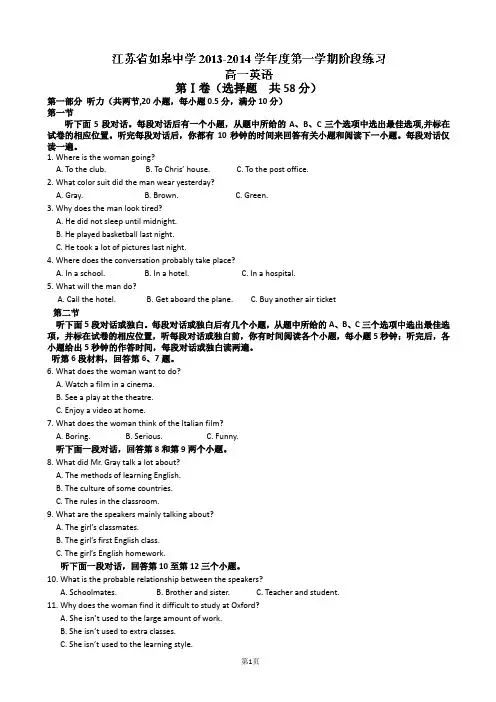
第Ⅰ卷(选择题共58分)第一部分听力(共两节,20小题,每小题0.5分,满分10分)第一节听下面5段对话。
每段对话后有一个小题,从题中所给的A、B、C三个选项中选出最佳选项,并标在试卷的相应位置。
听完每段对话后,你都有10秒钟的时间来回答有关小题和阅读下一小题。
每段对话仅读一遍。
1. Where is the woman going?A. To the club.B. To Chris’ house.C. To the post office.2. What color suit did the man wear yesterday?A. Gray.B. Brown.C. Green.3. Why does the man look tired?A. He did not sleep until midnight.B. He played basketball last night.C. He took a lot of pictures last night.4. Where does the conversation probably take place?A. In a school.B. In a hotel.C. In a hospital.5. What will the man do?A. Call the hotel.B. Get aboard the plane.C. Buy another air ticket第二节听下面5段对话或独白。
每段对话或独白后有几个小题,从题中所给的A、B、C三个选项中选出最佳选项,并标在试卷的相应位置,听每段对话或独白前,你有时间阅读各个小题,每小题5秒钟;听完后,各小题给出5秒钟的作答时间,每段对话或独白读两遍。
听第6段材料,回答第6、7题。
6. What does the woman want to do?A. Watch a film in a cinema.B. See a play at the theatre.C. Enjoy a video at home.7. What does the woman think of the Italian film?A. Boring.B. Serious.C. Funny.听下面一段对话,回答第8和第9两个小题。
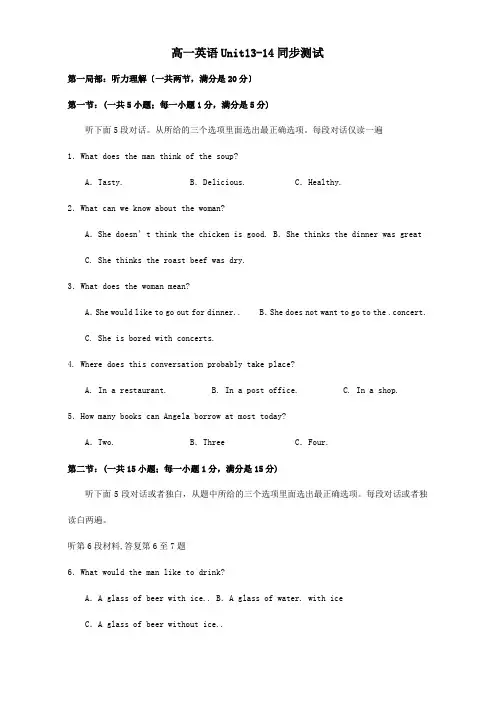
高一英语Unit13-14同步测试第一局部:听力理解〔一共两节,满分是20分〕第一节:(一共5小题;每一小题1分,满分是5分)听下面5段对话。
从所给的三个选项里面选出最正确选项。
每段对话仅读一遍1.What does the man think of the soup?A.Tasty. B.Delicious. C.Healthy.2.What can we know about the woman?A.She doesn’t think the chicken is good. B.She thinks the dinner was greatC. She thinks the roast beef was dry.3.What does the woman mean?A.She would like to go out for dinner.. B.She does not want to go to the .concert.C. She is bored with concerts.4. Where does this conversation probably take place?A. In a restaurant.B. In a post office.C. In a shop. 5.How many books can Angela borrow at most today?A.Two. B.Three C.Four.第二节:(一共15小题;每一小题1分,满分是15分)听下面5段对话或者独白,从题中所给的三个选项里面选出最正确选项。
每段对话或者独读白两遍。
听第6段材料,答复第6至7题6.What would the man like to drink?A.A glass of beer with ice.. B.A glass of water. with iceC.A glass of beer without ice..7.What can we learn from the conversation?A.The woman dislikes surfing at all.B.The man and Jack have made up their mind to go surfing.C.The two speakers will go surfing together.听第7段材料,答复第8至10题。
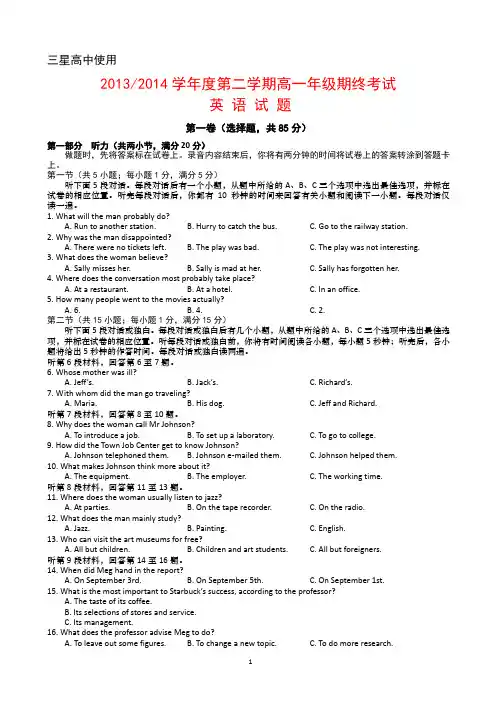
三星高中使用2013/2014学年度第二学期高一年级期终考试英语试题第一卷(选择题,共85分)第一部分听力(共两小节,满分20分)做题时,先将答案标在试卷上。
录音内容结束后,你将有两分钟的时间将试卷上的答案转涂到答题卡上。
第一节(共5小题;每小题1分,满分5分)听下面5段对话。
每段对话后有一个小题,从题中所给的A、B、C三个选项中选出最佳选项,并标在试卷的相应位置。
听完每段对话后,你都有10秒钟的时间来回答有关小题和阅读下一小题。
每段对话仅读一遍。
1. What will the man probably do?A. Run to another station.B. Hurry to catch the bus.C. Go to the railway station.2. Why was the man disappointed?A. There were no tickets left.B. The play was bad.C. The play was not interesting.3. What does the woman believe?A. Sally misses her.B. Sally is mad at her.C. Sally has forgotten her.4. Where does the conversation most probably take place?A. At a restaurant.B. At a hotel.C. In an office.5. How many people went to the movies actually?A. 6.B. 4.C. 2.第二节(共15小题;每小题1分,满分15分)听下面5段对话或独白。
每段对话或独白后有几个小题,从题中所给的A、B、C三个选项中选出最佳选项,并标在试卷的相应位置。
听每段对话或独白前,你将有时间阅读各小题,每小题5秒钟;听完后,各小题将给出5秒钟的作答时间。
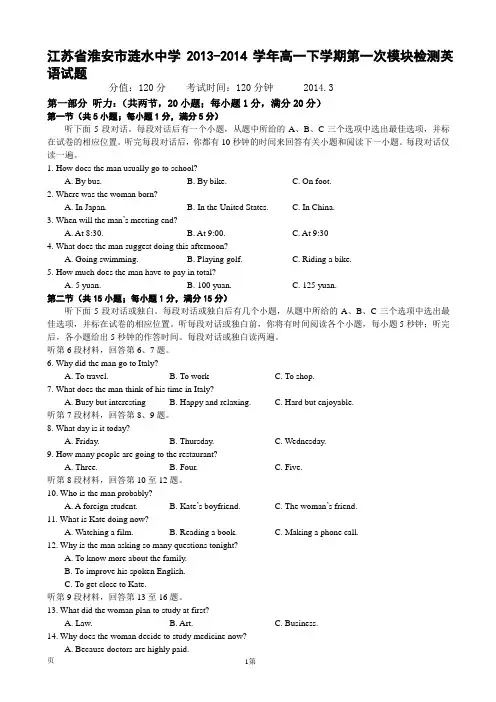
页 1第
江苏省淮安市涟水中学2013-2014学年高一下学期第一次模块检测英语试题
分值:120分 考试时间:120分钟 2014.3 第一部分 听力:(共两节,20小题;每小题1分,满分20分) 第一节(共5小题;每小题1分,满分5分) 听下面5段对话。每段对话后有一个小题,从题中所给的A、B、C三个选项中选出最佳选项,并标在试卷的相应位置。听完每段对话后,你都有10秒钟的时间来回答有关小题和阅读下一小题。每段对话仅读一遍。 1. How does the man usually go to school? A. By bus. B. By bike. C. On foot. 2. Where was the woman born? A. In Japan. B. In the United States. C. In China. 3. When will the man‟s meeting end? A. At 8:30. B. At 9:00. C. At 9:30 4. What does the man suggest doing this afternoon? A. Going swimming. B. Playing golf. C. Riding a bike. 5. How much does the man have to pay in total? A. 5 yuan. B. 100 yuan. C. 125 yuan. 第二节(共15小题;每小题1分,满分15分) 听下面5段对话或独白。每段对话或独白后有几个小题,从题中所给的A、B、C三个选项中选出最佳选项,并标在试卷的相应位置。听每段对话或独白前,你将有时间阅读各个小题,每小题5秒钟;听完后,各小题给出5秒钟的作答时间。每段对话或独白读两遍。 听第6段材料,回答第6、7题。 6. Why did the man go to Italy? A. To travel. B. To work C. To shop. 7. What does the man think of his time in Italy? A. Busy but interesting B. Happy and relaxing. C. Hard but enjoyable. 听第7段材料,回答第8、9题。 8. What day is it today? A. Friday. B. Thursday. C. Wednesday. 9. How many people are going to the restaurant? A. Three. B. Four. C. Five. 听第8段材料,回答第10至12题。 10. Who is the man probably? A. A foreign student. B. Kate‟s boyfriend. C. The woman‟s friend. 11. What is Kate doing now? A. Watching a film. B. Reading a book. C. Making a phone call. 12. Why is the man asking so many questions tonight? A. To know more about the family. B. To improve his spoken English. C. To get close to Kate. 听第9段材料,回答第13至16题。 13. What did the woman plan to study at first? A. Law. B. Art. C. Business. 14. Why does the woman decide to study medicine now? A. Because doctors are highly paid. 页 2第
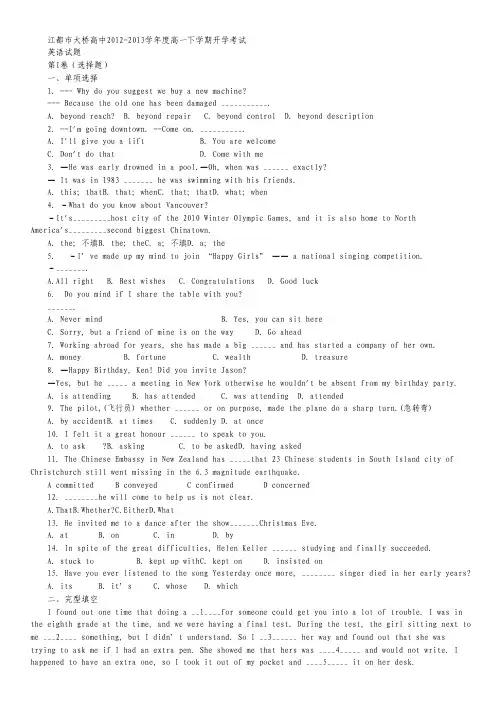
江都市大桥高中2012-2013学年度高一下学期开学考试 英语试题 第I卷(选择题) 一、单项选择 1.--- Why do you suggest we buy a new machine? --- Because the old one has been damaged ___________.A. beyond reach?B. beyond repairC. beyond controlD. beyond description 2.--I'm going downtown. --Come on. __________.A. I'll give you a liftB. You are welcomeC. Don't do thatD. Come with me 3.—He was early drowned in a pool.—Oh, when was ______ exactly? — It was in 1983 _______ he was swimming with his friends.A. this; thatB. that; whenC. that; thatD. what; when 4.-What do you know about Vancouver? -It's_________host city of the 2010 Winter Olympic Games, and it is also home to NorthAmerica's_________second biggest Chinatown. A.the; 不填B.the; theC.a; 不填D.a; the 5. -I’ve made up my mind to join “Happy Girls” —— a national singing competition. -_______.A.All rightB. Best wishesC. CongratulationsD. Good luck 6. Do you mind if I share the table with you? ______.A. Never mindB. Yes, you can sit hereC. Sorry, but a friend of mine is on the wayD. Go ahead 7.Working abroad for years, she has made a big ______ and has started a company of her own.A. moneyB. fortuneC. wealthD. treasure 8.—Happy Birthday, Ken! Did you invite Jason? —Yes, but he _____ a meeting in New York otherwise he wouldn't be absent from my birthday party. A.is attending B.has attended C.was attending D.attended 9.The pilot,(飞行员) whether ______ or on purpose, made the plane do a sharp turn.(急转弯)A. by accidentB. at timesC. suddenlyD. at once 10.I felt it a great honour ______ to speak to you.A. to ask ?B. askingC. to be askedD. having asked 11.The Chinese Embassy in New Zealand has _____that 23 Chinese students in South Island city of Christchurch still went missing in the 6.3 magnitude earthquake.A committedB conveyedC confirmedD concerned 12.________he will come to help us is not clear.A.ThatB.Whether?C.EitherD.What 13.He invited me to a dance after the show_______Christmas Eve.A. atB. onC. inD. by 14.In spite of the great difficulties, Helen Keller ______ studying and finally succeeded.A. stuck toB. kept up withC. kept onD. insisted on 15.Have you ever listened to the song Yesterday once more, ________ singer died in her early years?A. itsB. it’sC. whoseD. which 二、完型填空 I found out one time that doing a __1____for someone could get you into a lot of trouble.I was in the eighth grade at the time, and we were having a final test.During the test, the girl sitting next to me ___2____ something, but I didn’t understand.So I __3______ her way and found out that she wastrying to ask me if I had an extra pen.She showed me that hers was ____4_____ and would not write.I happened to have an extra one, so I took it out of my pocket and ____5_____ it on her desk. Later, after the test papers had been turned in, the teacher asked me to stay in the room when all the other students were____6_____.As soon as we were alone she began to talk to me about ____7____ it meant to grow up; she talked about how important it was to____8____ your own two feet and be responsible for your own ____9____.For a long time, she talked about honesty and emphasized the fact ____10____ when people do something____11____, they are really cheating themselves.She made me ____12____ that I would think seriously about all the things she had said, and then she told me I could leave.I walked out of the room ____13____ why she had chosen to talk to me about all those things. ___14____, I found out that she thought I had cheated on the test.When she saw me lean over to talk to the girl next to me, it looked as if I was copying answers ____15____ the girl’s test paper.I___16____ to explain about the pen, but all she____17____ say was that it seemed very strange to herthat I hadn’t talked of anything about the pen the day she talked to me ____18____ after thetest.____19____ I tried to explain that I was just doing the girl a favor by letting her use my pen, I was sure she ____20____ to believe that I had cheated on the test. A.help B.hand C.favor D.fever A.whispered B.talked C.told D.spoke A.turned over B.came over C.leaned over D.looked over A.out of sightB.out of workC.out of place D.out of ink A.place B.put C.gave D.lent A.punished B.dismissed C.praised D.parted A.what B.that C.which D.how A.stand up B.stand on C.stand for D.stand by A.attitude B.activity C.action D.behavior A.what B.if C.that D.where A.honest B.dishonest C.modest D.disappointed A.promise B.permit C.recognize D.prove A.wandering B.reflecting C.understandingD.wondering A.Long before B.Therefore C.Ever before D.Later on A.of B.in C.from D.on A.managed B.planned C.tried D.promoted A.could B.would C.can D.will A.right B.only C.slight D.once A.After B.Until C.As if D.Even if 20.A.remained B.continued C.kept D.wanted 三、阅读理解 A Somehow Rey had managed to struggle free from the rope around his neck, after being left to die a slow death as punishment for being a bad Spanish greyhound(猎狗). It is believed that 50,000 greyhounds are killed by their owners in Spain each year after they grow too old, or turn out to be too slow to hunt with.Dogs have also been found thrown into wells, burnt alive and even injected with poison. But Rey's intended fate(命运) was, even within the levels of cruelty usually shown to Spanish hunting dogs, especially cruel.The rope around his neck had been set at a height so that his front paws could not touch the ground, meaning that he was intended to stand on his back legs until he was tootired to support himself.When his legs finally became too tired, the rope should have done its work. "They call it the typewriting death, because the dog's back legs struggled against the ground and make the clicking sound of a typewriter," said Albert Sorde, of the SOS Galgos greyhound rescue group."It is a punishment for greyhounds that are thought to have made their owners lose face." "Rey's throat was severely damaged but we managed to find a vet to operate and, though it was expensive, he survived," he said. Greyhounds in Spain are used for hunting hares(野兔)."The dogs are meant to imitate theswerves(转向)of the hares," said Sorde."Those who don't, and make their owners look bad, are called 'dirty greyhounds' and are most likely to be killed by the typewriter method." 1.Rey was intended to be killed by . A........................e passage is developed mainly by ________. A. presenting the effect and analyzing the causes B. following the order of time C. describing problems and drawing a conclusion D. making comparison of ideas 第II卷(非选择题) 四、阅读填空 阅读下面短文,按照句子结构的语法性和上下连贯的要求,填入适当的词或使用括号中词语的正确形式填空。
第 1页 共 10页 2014年高一英语寒假作业检测题 (考试时间100分钟,满分120分) 第I卷 (选择题,共85分) 一、单项选择(共35小题;每小题1分,满分35分) 请认真阅读下面各题,从题中所给的A、 B、 C 、D 、四个选项中,选出最佳选项,并在答题卡上将该项涂黑。 1. After ______ long search for information on ______ Internet, he found what he wanted to know about Yetis. A. the; the B. the; / C. a; / D. a; the 2. The girl __________ an English song in the next room is Tom‟s sister. A. who is singing B. is singing C. who was singing D. who sang 3. Jeanne was her old friend, _________she borrowed a necklace. A. from who B. from whom C. to that D. to whom 4. The place _______interested me most was the Children's Palace. A. in which B. where C. what D. which 5. This is one of the best films _______. A. that have been shown this year B. that have shown C. that has been shown this year D. that you talked 6. Can you lend me the book ______the other day? A. about which you talked B. which you talked C. about that you talked D. that you talked 7. They arrived at a farmhouse, in front of ______sat a small boy. A. whom B. who C. which D. that 8. The engineer ______my father works is about 50 years old. A. to whom B. on whom C. with which D. with whom 9. Is there anyone in your class ______family is in the country? A. who B. who's C. which D. whose 10. I'm interested in ______you have said. A. all that B. all what C. that D. which 11. The way ______he looks at problems is wrong. A. which B. whose C. what D./ 12. I, _________ your good friend, will try my best to help you out. A. who is B. who am C. that is D. what is 13. The first thing ________ we should do is to water the flowers in front of the room. A. which B. as C. what D. that 14. Any girls ________ knew him were teachers. A. where B. that C. they D. whom 15. ____________ is the most useful invention? A. Do you think which of these B. Which of these do you think C. Which of these you think D. You think which of these 16. Which of the books _________ were borrowed from him is the best? A. which B. who C. that D. whose 17. — What‟s the weather like in Xiamen? — Pretty hot and wet in the summer, but it ______ be quite cold in the winter. 第 2页 共 10页
A. should B. can C. will D. must 18. William Shakespeare was a writer and poet ______ works are considered the greatest in the world. A. whose B. who C. which D. that 19. — It is very seldom that one would be invited to a British person‟s home. — That‟s true. Whether the person you know is a work colleague or a neighbor, being invited inside their house is quite ______. A. normal B. often C. rare D. proper 20. Katherine ______ on that poem for a month, and it‟s still not finished. A. had been working B. has been working C. has worked D. had worked 21. Don‟t use mobile phones on buses or trains. You will ______ other people. A. disturb B. dismiss C. discourage D. disappoint 22. — What‟s the matter, Ann? — You know, I‟m never ______ my best early in the morning. A. in B. at C. with D. within 23. I‟ll look into the matter as soon as possible. Just have a little ______. A. wait B. time C. rest D. patience 24. There is a little shop called a “tuck shop” ______ we can go to in our breaks but it just sells rubbish. A. where B. when C. which D. what 25. — Can I come to see you at ten o‟clock, John? — I‟m sorry, Jo, but I ______ my uncle then. A. visited B. will visit C. will be visiting D. am visiting 26. He is an optimistic man with great devotion to his work and I really ______ people like that. A. look forward to B. look up to C. look down on D. look back on 27. Before going into the cave, take more flashlights with you ______ one of these doesn‟t work. A. as if B. even though C. so that D. in case 28. A friend is someone who knows your worst secrets, but loves you ______. A. anyway B. somehow C. anymore D. anywhere 29. If you book the air tickets one month ______, you may save a lot of money. A. in advance B. at present C. on time D. in time 30. The people I teach English to come from very different backgrounds, ______? A. don‟t I B. do they C. don‟t they D. do I 31. We will discuss a number of cases ___ beginners of English fail to use the language properly. A. which B. as C. why D. where 32. This is the reason _________ we made Mr Li headmaster of our school. A. where B. when C. before D. why 33. The student who does well in his lesson is the monitor ____ is very modest and studies hard. A. who B. that C. as D. which 34. It was said ________ ________ was all ________ he said. A. that; what; what B. what; /; what C. that; what; that D. that; that; that 35. ________ is often the case, we have worked out the production plan. A. Which B. When C. What D. As 二、完形填空(共20小题;每小题1分,满分20分)